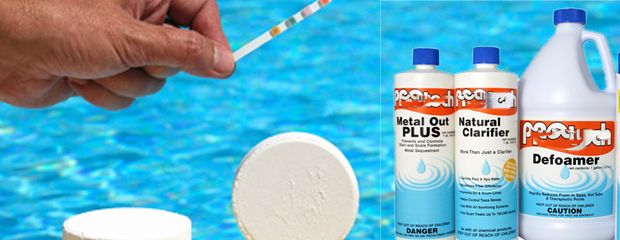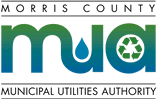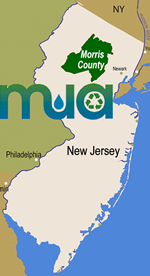Transfer Station Info (Tip Fee $113.00/ton)
- Mt. Olive Mon-Fri 7:30am-3pm; Sat 7:30am-11am
- Parsippany Mon-Fri 7am-3pm; Sat 7:30am-11am
- No Rental Trucks
- Payment by Account, Check, Credit Card. No Cash

Morris County
Municipal Utilties Authority
Join
3/6/26, 11AM MCMUA Bid Opening #2026-SW01 - 3 SELF CONTAINED COMPACTING UNITS
Join via Webex
or use the call in number: 408-418-9388 with Access code: 2348 996 4225.
Click to go to Notice/Bids Page

F.A.Q. Pool Chemicals
The MCMUA operates one of NJ's most comprehensive household hazardous waste (HHW) programs. This F.A.Q. page and information on hazardous materials is intended as a guide about HHW materials as well as the MCMUA's HHW program. This information is a general guide and does not constitute official rule, regulation or law.
Hazardous Waste Materials
- Adhesives
- Aerosols
- Antifreeze
- Appliances (CFCs)
- Art & Crafts
- Asbestos
- Batteries (Auto & Boat)
- Batteries, Household (dry cell)
- Cell Phones
- Compressed Gas Cylinders
- Driveway Sealer
- Electronics
- Fire Extinguishers
- Fluorescents
- Gasoline
- Medical Waste
- Kerosene
- Mercury
- Motor Oil & Filters
- Muriatic Acid (HCl)
- Paints & Stains
- Pesticides
- Photo Chemicals
- Pool Chemicals
- Propane
- Rock Salt
- Smoke Detectors
- Solvents
- Wood with Lead Paint
Many pool chemicals are used to sanitize, clean, or balance the water in swimming pools, hot tubs, and spas. A partial list of pool chemicals includes chlorinated isocyanurates, lithium hypochlorite, sodium bicarbonate, potassium monopersulfate, hydrogen peroxide, sodium hypochlorite , calcium hypochlorite, and certain ammonium, brominated, copper and silver compounds, and muriatic acid. Pool chemicals involved in fire or toxic vapor releases are likely to include those that add chlorine or a chlorine ion to the pool water for bacterial control. Chemicals that release chlorine are among the group of chemicals classified as "oxidizers." These pool oxidizer chemicals include calcium hypochlorite, sodium hypochlorite, and chlorinated isocyanurates. Other pool chemicals are used to control the growth of algae or fungus, to adjust the acidity or alkalinity (pH control) and to clarify the pool water.
The pH of a pool is controlled by adding either acid or alkali products. An acid, either muriatic acid (also known as hydrochloric acid) or sodium bisulphate, is added to lower the pH. To raise the pH, an alkali, sodium carbonate (also known as soda ash) is added.
Additionally, pools use sanitizing chemicals to remove algae, harmful bacteria, dirt, germs, and organic matter carried into the pool on people’s bodies and by the wind. These chemicals oxidize organic matter. Most typically, a chlorine product is used to sanitize the pool. Either a liquid chlorine (typically sodium hypochlorite) or dry chlorine (usually calcium hypochlorite) is used.
Pool and spa chemicals may be corrosive, meaning they may cause skin and eye damage. Many pool chemicals, including different types of chlorine, can react violently when mixed, producing toxic gases, fire, and/or an explosion.
Hazards
- Sodium hypochlorite, the active ingredient in most pool chemicals, can irritate eyes and skin.
- Do not allow chlorine tablets, pellets or flakes to get moist or wet, as they will start to emit highly corrosive and toxic chlorine gas! Do not attempt to transport moistened chlorine tablets, pellets or flakes – you may not survive the trip!
-
Sodium hypochlorite is highly reactive; can cause fire if in contact with organic materials.
Handling
- Handle with rubber gloves.
- Click here to download a PDF flyer developed by the MCMUA regarding the safe use and disposal of pool chemicals or click here to read an EPA safety alert on pool chemicals.
- Minimize the different types of chemicals you store.
- Don't buy more than you will consume in a season. Some of the more hazardous pool chemicals don't keep well.
- Keep wet hands and dirty scoops out of your chemicals. Contamination is often a cause of problems.
- Don't store pool chemicals where other materials can fall into them.
- Never, NEVER, NEVER, mix chemicals. When adding chemicals to your pool allow one to disappear before adding another.
- Make sure chemicals are locked away from small children.
- Always label containers.
- ALL forms of acids react DANGEROUSLY with all forms of chlorine or bromine. Never, never, NEVER mix swimming pool chemicals of any type! Chlorine compounds that look or smell alike may not be the same: you have to know the actual chemical. Allowing even small amounts of different chlorine sanitizers to touch each other can be REALLY dangerous. In particular, trichlor and calcium hypochlorite can react dangerously on contact with each other. Once they're dissolved in the pool, though, they get along fine.
-
Do not mix with ammonia or vinegar as it will produce toxic chloramine gas.
Management Options
- Do not dispose of in the trash or down the drain.
-
Take to HHW collection day or hazardous waste facility.
Historical Safety Note
In July 2003 and July 2008 fires occurred at the MCMUA's Mount Olive transfer station. In both fires it is suspected that a small quantity of pool chemical was improperly disposed of in the regular trash. When dumped on the tipping floor at the transfer station it mixed with the moist garbage and the leachate (liquid) generated in the garbage. This likely caused the pool chemical to start reacting and oxidizing. This in turn generated the heat and the oxygen necessary and sufficient to ignite the entire pile of waste on the tipping floor.
The lesson is to never throw away pool chemicals, or other household hazardous wastes, in the regular garbage. Luckily, nobody was seriously injured

